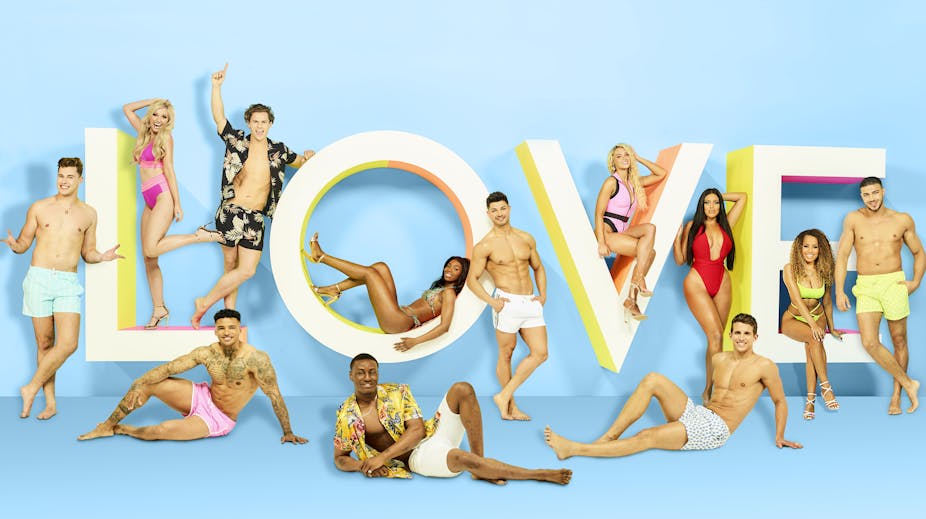The reality TV dating series Love Island has captured the hearts and minds of the UK public. The 2018 series attracted some 4m viewers across eight weeks, and audiences have been eagerly speculating about possible winning matches among the new cast of contestants, since the premiere of the fifth series on June 3, 2019.
The Radio Times has said that Love Island’s “winning formula” is the work of the casting team, who find a “varied mix of individuals who strike the balance of being compatible with one another”.
As part of an ongoing research collaboration into TV and film, we analysed the 2018 series of the ITV show – and the public’s reaction to it – and found that one of the key ingredients for the show’s popularity is not the romantic couplings, but the bromances formed.
We analysed all 59 Love Island 2018 episodes, as well as social media interactions from viewers on Instagram and Twitter. Our initial findings suggest that a number of viewers favour bromantic over romantic relationships in the show – and that is to be welcomed, as these bromances offer audiences a healthy model for supportive, accepting and happy relationships.
In the name of bruv
Bromance (seen as an intense emotional bond between straight men) has become a popular and marketable aspect of film and TV. In hit American TV series such as animated sitcom Family Guy, and hospital-based comedy Scrubs, and in films such as Ted, The Hangover franchise, and The Cornetto Trilogy, written by British male comedy duo Edgar Wright and Simon Pegg, bromances often carry greater emotional weight in storylines than the relationships between heterosexual couples.
In 2018, the popular Love Island bromance was between self-confessed “Jack the Lad” former stationary sales manager Jack Fincham, and “Steady Eddy” A&E doctor Alex George. This bromance manifested throughout the show in confessions such as “I love you to death mate” and Jack calling Alex “a peng sort” to which Alex replied: “thanks Jack, you’re a sort as well”.
There were calls from viewers to bend the rules and allow a bromance to win the show - mirroring previous calls in the 2017 series of Love Island regarding the bromance between contestants Chris Hughes and Kem Cetiney.
The pair developed a friendship early on in the series and went on to have a successful reality TV career together after the show, as well as producing a rap song Little Bit Leave It, named after one of their sayings.
A healthy sight
With comedy, compassion, camaraderie, and consistency (or what we’ve called “the four Cs”), bromances in Love Island show a way for relationships to have a dynamic that is open, friendly and supportive, rather than jealous and manipulative – as some of the show’s romantic relationships turned out to be.
Read more: Love Island: Adam shows teenagers how not to treat romantic partners
Conversations within the Love Island bromances have been some of the most comical throughout all four series of the show. Viewers enjoy the comedic value of these relationships, and embrace their banter and catch phrases, using them as hashtags on social media and wearing branded clothing.
In a society where male mental health has been labelled a “silent crisis”, the spotlight on bromantic pairings on Love Island gives viewers an insight into male feelings. The heartfelt, compassionate, and often deep conversations between bromantic pairs are a refreshingly healthy sight for British reality television.
Society generally is becoming increasingly vocal about mental health, and young people are becoming especially concerned with the psychological pressures exerted by a near-constant exposure to social media and reality TV. The conversations between male friends on reality TV shows such as Love Island demonstrate how important it is for men to talk about their feelings more openly, which can work to improve mental health.
The bromantic relationships between former contestants have presented glimmers of mutual trust and friendship. In a television show with a tendency to “mug” or “pie” people off within romantic couplings – for instance, through re-coupling or cheating – these bromances have taught viewers a lot about the importance of togetherness, solidarity and respect.
In a programme focused on re-coupling, bromance is often the one constant storyline throughout the series – and beyond. The friendships formed between Love Island contestants often last longer after the show has finished than the romantic couplings.
Friendship first
While anticipation about the winning couple in the Love Island villa in the latest series begins to grow, we suggest viewers also pay attention to the emerging bromances. Friendships play a vital role in all people’s lives, alongside romantic partnerships.
Love Island’s artificially created relationships and scheduled “coupling up” activities create plenty of drama – but we argue it is the natural and enduring bonds of friendship that really win viewers over. As viewers see and celebrate the power of the bromance in Love Island, we hope they also pause to appreciate the friendships they have in their own lives – regardless of their relationship status.

